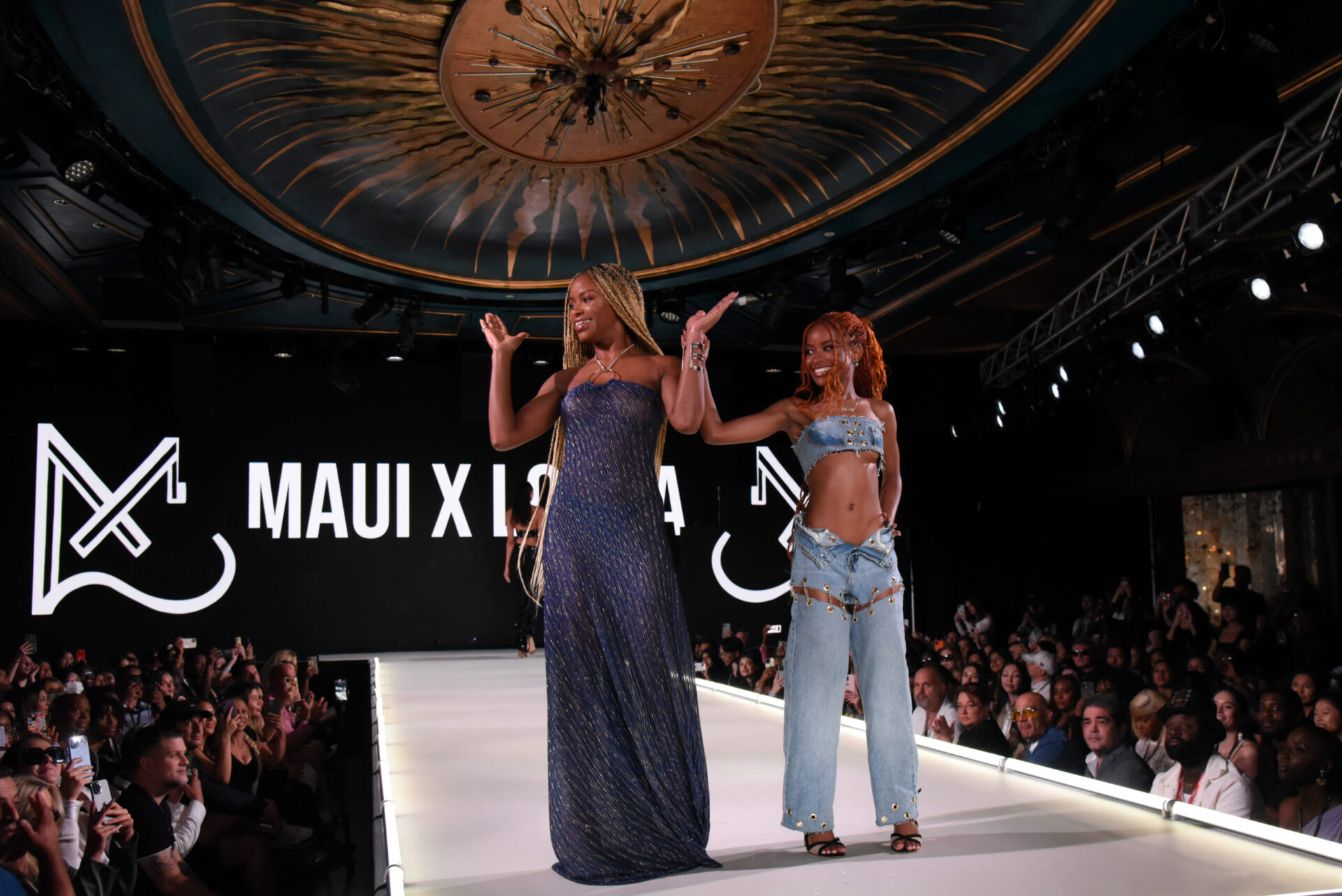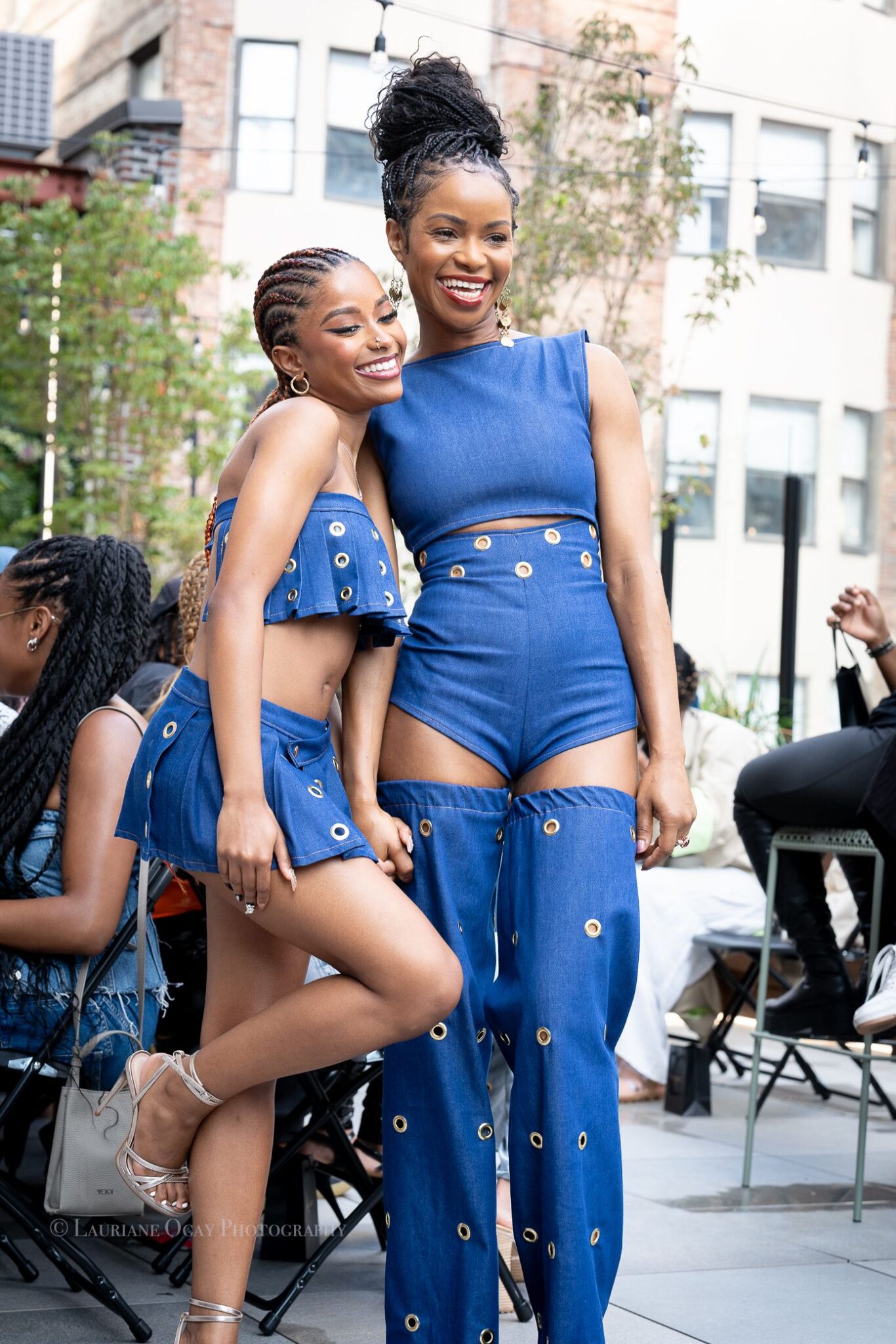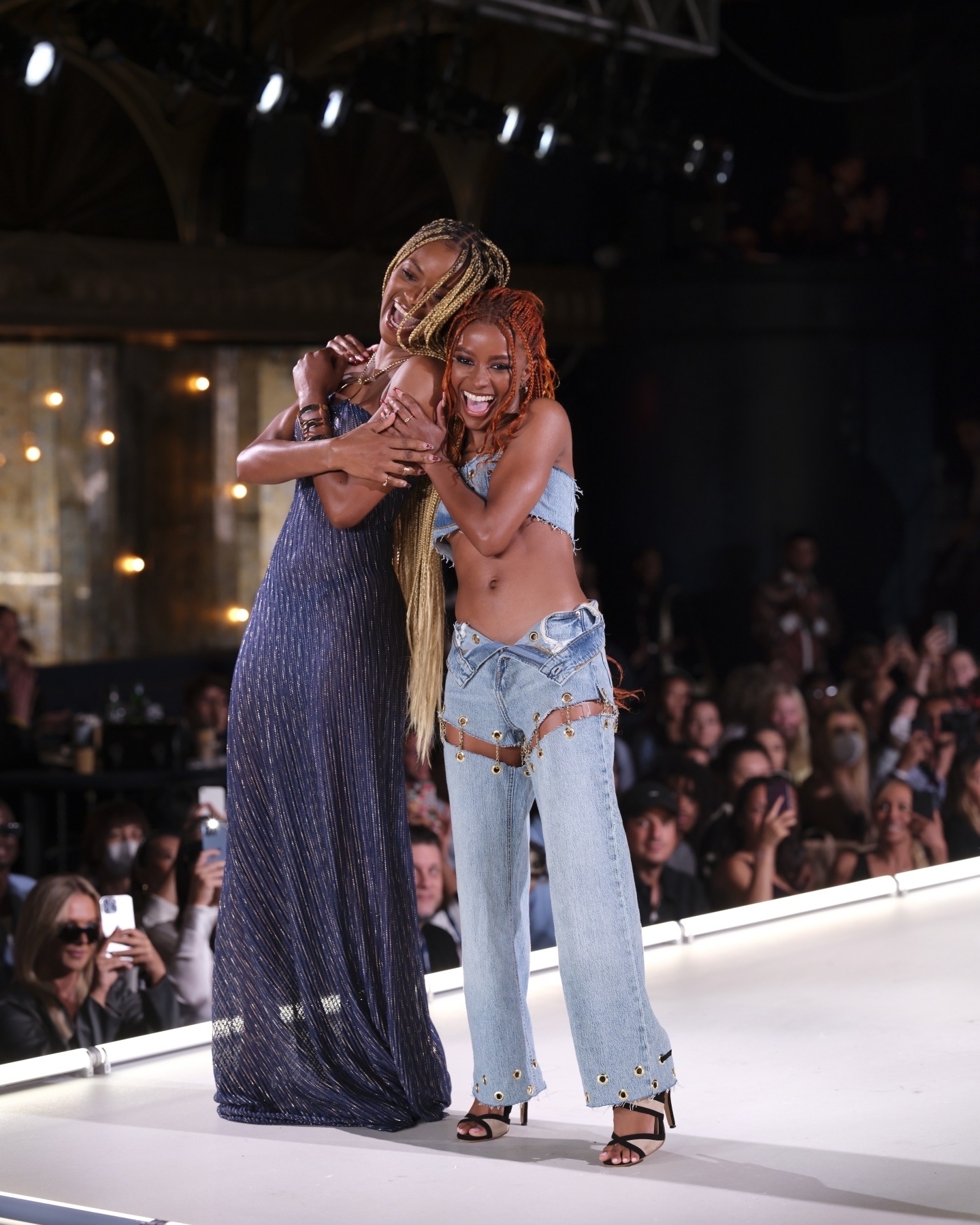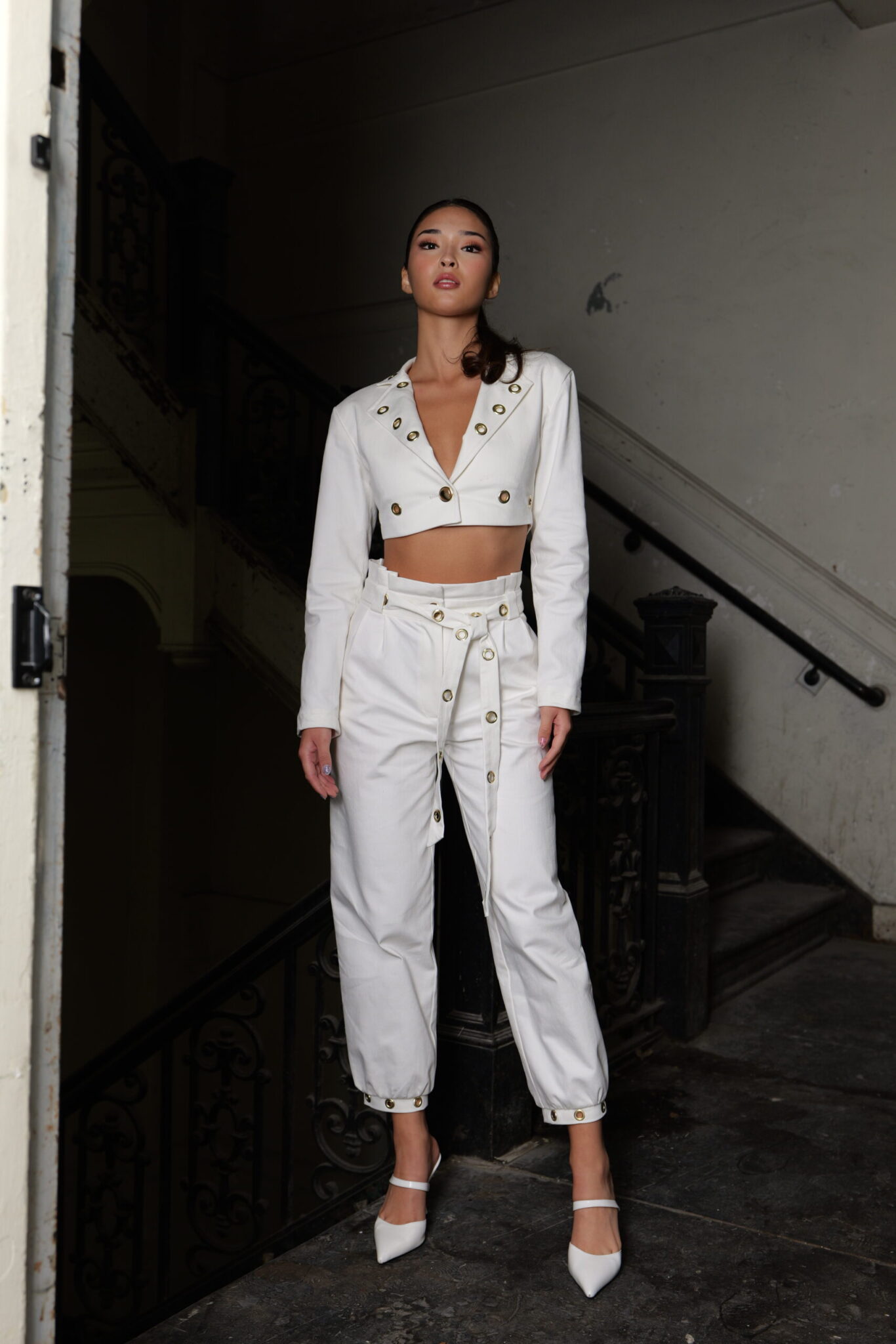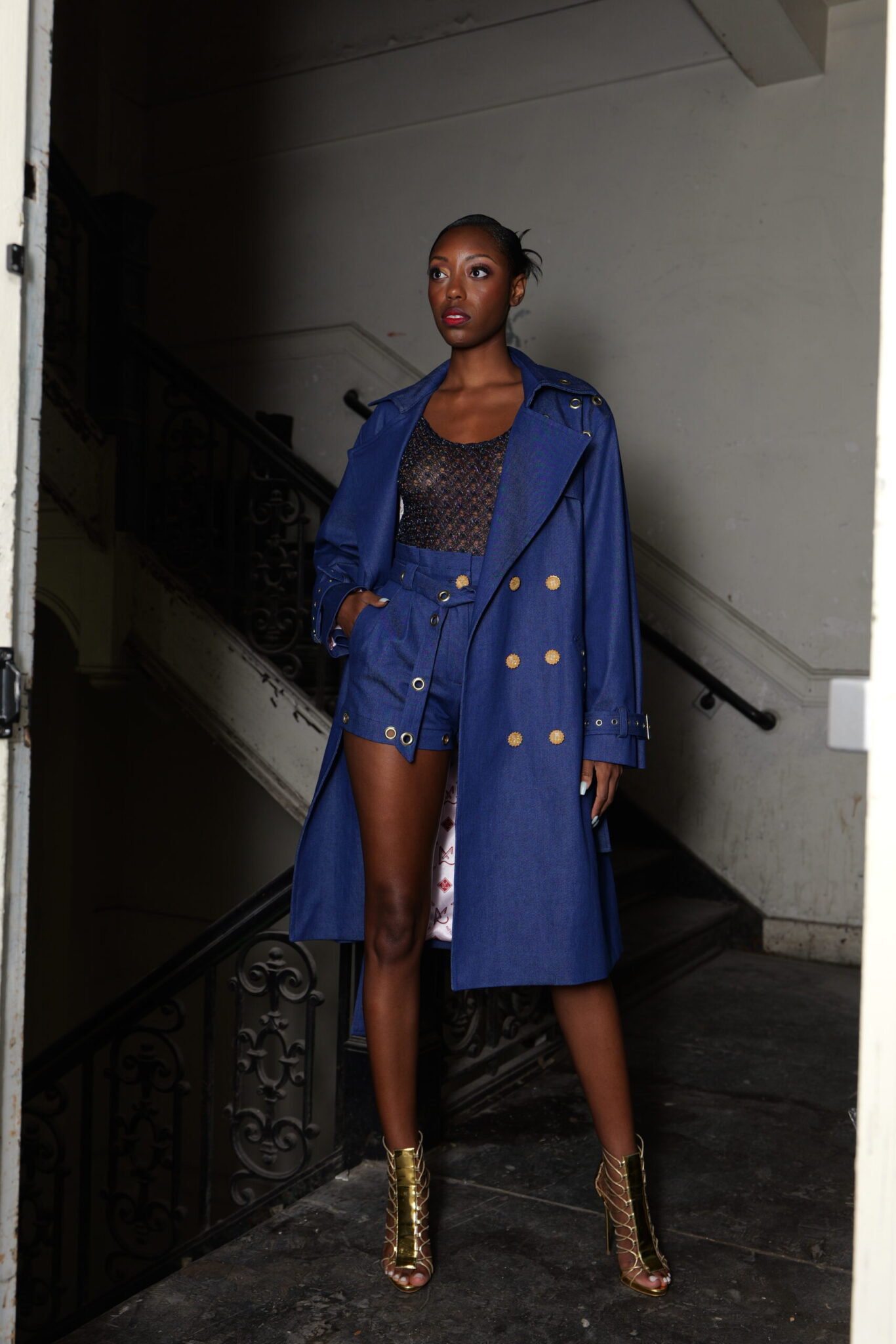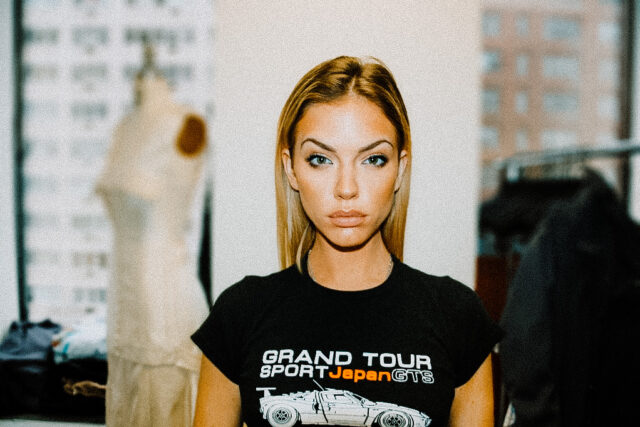INTERVIEW: Maui X Lolita’s Road to New York Fashion Week Is Stylish, Sustainable, and For Fly Girls Only
New York Fashion Week is just a couple of weeks away, and designers all over the city are in the studio adding the final touches to their collections. Or, they’re getting ready to take it down and start over, as Maui X Lolita’s founder and head designer, Lolita Malone, joked during our sit-down.
The mother-daughter duo Maui X Lolita is debuting their first fall/winter show since the brand’s inception in 2020; you know, when everyone was making banana bread, making whipped coffee, and dancing to Doja Cat’s “Say So?” Yes, that same year, Maui and Lolita Malone embarked on “Quarantine Couture.” Quarantine Couture turned into athletic wear and is now a vault of unique, ready-to-wear clothes that will turn heads at every corner. The “Corinne” top and skirt are what casual yet girly dreams are made of.
Ahead of their “Modern Rebellion” runway show, Glitter got a glimpse into some new pieces and sat down with Lolita Malone at the team’s 34 St. studio to discuss the importance of sustainability, personal style, and what it means to be a “Fly Girl.”
Check out the full interview below.
BRITTANY: Maui X Lolita was established in 2020. How did that come about?
LOLITA: I’ve been a designer for over 20 years. I did swimsuits, and a little fun fact, I used to design for dancers in gentlemen’s clubs. That’s how I started. I was in college at the time, and I would just make the clothes for all the entertainers. I did that for many years, and then I switched to primarily swimwear. During the pandemic, my daughter Maui was home from school, and we started designing what we would call “quarantine couture,” where we were designing clothes just for ourselves. The first tracksuits I made were the Eden tracksuit and the Goddess tracksuit. It was a gold one, and we liked it so I thought, “Yeah, we should sell that.” We just started everything from scratch. At our first business meeting, we put a full plan in motion and created everything you see today. In the beginning, we designed the clothes, made the clothes, modeled the clothes, and did the commercial. We did every single thing ourselves in 2020, and it just kind of grew from there. We did quite well online and had a lot of fun in the beginning, then once the world sort of opened back up, we said, “Let’s just go full force into it.” And we haven’t stopped since.
MAUI: I’ve been interested in fashion my entire life. When I was a kid, I wanted to be a model and often took my mom’s fabric scraps from her sewing to make clothes for my Barbie dolls. As I grew up, I grew a little out of fashion and into acting, but when the pandemic happened, I moved back home from college, and she and I spent more time together than we ever had. In 2020, she often made clothes for fun, eventually making the Goddess tracksuit we both decided we needed to sell. As a big dreamer, I had these huge plans for us and thought about creating a huge brand. That’s exactly what we did. As she was mostly on the designer side, I focused on the branding: name, colors, slogan, characteristics, etc. From there, out came the birth of MxL.
BRITTANY: Let me ask you: What is it like to work alongside your mother/daughter?
LOLITA: A lot of people ask, “How do you work with your mom?” And the thing is we work perfectly well together. We balance each other out like we have to. We get along great. We very rarely fight. The things that I’m not good at, she’s great at, and the things that she’s not good at, I’m great at. So we know our specific roles, and we kind of fall into that, like, she’s a creative director. So the overall broader vision of the brand—you know, she has that. But the actual design concepts are generally mine. She has her input too. She will design a few pieces per collection, but for the most part, I select the fabrics, the designs, and all the fine details because, you know, that’s my area of expertise. She’s also on the finance side. Maui graduated with a finance degree from Loyola Marymount last spring, so she also brings that to the table, where she balances the books and helps just keep the business afloat. But we just balance each other out very well. We get along. The things that I don’t want to do that I absolutely hate, she does, and she does them well. So it’s amazing working with her.
MAUI: It’s actually the most wonderful experience. A lot of people tend to bump heads when working alongside family, but my mom is my best friend. We have an insane amount of creative chemistry, and we make up for what the other lacks. Our different ages allow us different perspectives on the industry. It’s the perfect duo for a successful fashion line.
BRITTANY: Maui X Lolita had such a successful year. You guys even challenged the statistic that only 4% of Black-owned businesses are still running three and a half years later. Can you talk about just the triumphs and the highs and lows of being a Black-owned business in the fashion industry?
LOLITA: I think for me, one of the pluses of being Black-owned is that there is no lack of creativity; there is no lack of color, vibrancy, and authenticity. We like colors that stick out, and when you see them, you recognize the brand. When it comes to other aspects of being a Black designer, though, it’s survivability and sustainability. It’s hard—much harder because you still have to make a profit. You have to keep the lights on, and you have to pay your people. So, that part is a struggle. You know, you have to find grants and investors and all that because it’s very expensive, especially in Manhattan, to keep a business afloat. So, we have garnered a lot of attention. We have a solid team behind us. Jess and her team are amazing. You know, my guys here in the office are amazing. Maui is my support system for my friends and family at home; that also helps. When you have people behind you to hold you up when you’re falling and to push you—especially when you second-guess yourself and want to say, “I’m done, I can’t do this anymore. I want to give up.” It’s like, you know, you got it. Just keep on pushing. Just hold on. Just go. It’s very important. Just having the right people with you who believe in you and who aren’t just there to be there—you know you have a good product, and it’s just a matter of the right person or people. When you see that product, you just know this is it. You cannot deny this [gesturing to her Trinity Red Trench Coat on the mannequin next to us.]
BRITTANY: Maui X Lolita is for the “Fly Girls,” for the girls who want to stand out. Why was it important to make that your mantra and to kind of show that through your work?
LOLITA: So I’m a 90s girl. I grew up with the fly fashionistas. You know, Mysa Hilton-Brim, June Ambrose, the designer back then, and Mary J. Blige is one of my fly girls. J.Lo, so girls like that who wore the, you know, the snakeskin and the leopard print and the blond hair and the big, bold colors and bright things. For me, those were my inspirations from that era. So, I took that for “Fly Girls Only.” So, like, no dull, boring colors. I’m wearing black now. But it’s not boring. If you’re going to do black, you’ve got to put some pop in. So you have to add some color and some flair. I, we hated the whole beige nude, you know, of the thing of like the early, like, you know, early 20, 2020s and the teens. It’s just like, give us some color, right? So, we try to make sure that everything we have has bright colors and bold designs. That’s what we wanted For Fly Girls Only. Don’t come up here wearing beige and mom jeans only. No. You better do something to those mom jeans. Put some color to it, like, look at Jess’s outfit [pointing to MxL’s publicist’s adorable pink and orange trench]. Like, you know, we’re wearing that. Like, we need some color. Fly Girls Only and Fly Guys. You have to add some pizzazz to it. You know, like you have to. Don’t fade into the background. Step boldly in the front, come on.
BRITTANY: You know, we’re not only seeing these huge trends but also these little, tiny microtrends that are also contributing to the fast fashion that we’re seeing. A big part of Maui X Lolita is keeping the carbon footprint low for sustainability. All of that can tell us how that comes to fruition.
LOLITA: When Maui and I first started, we decided that we would not be a part of the problem. We hate fast fashion. Yes, we all shop at Zara occasionally, and you can’t not. But you have that as your main area of fashion, and you’re helping these huge brands who don’t care about the environment, who aren’t paying their people, or are just overconsuming and supplying the world with things they don’t necessarily need. We pay individuals, artisans, tailors, and seamstresses in New York City to make our products. I do that myself, where we have our tailors that work with us, and they get paid a fair wage. Nothing is made in factories halfway around the world for pennies on the dollar. Everything is made here in New York City, down the street, or upstairs in our studio. So that way, we don’t have a surplus of inventory that we can’t sell. We start small with small batches, and once those things sell out, we’ll add more. The most popular items we have, we’ll add more of them. But for the lesser-selling items, we’ll just start with smaller amounts just so we don’t have the excess inventory just sitting around. When that happens, we either have to mark it down, which lowers the price of our brand, throw it away, or give it away. A lot of these brands burn their clothes because they don’t want people to have it at a lower price. We will not be a part of that problem at all.
BRITTANY: I think that’s amazing. That’s just one of the core values that Maui X Lolita holds. There’s accountability, there’s fair wages, and there’s so many core values that you guys have. Can you just tell me how having these core values is something that we don’t see in a lot of fashion brands?
LOLITA: There’s no money in it.
BRITTANY: Right? How does that shine through from your employees and your feedback on their work? You know, a lot of times people come to work burned out. You know, how do you see that?
LOLITA: We’re a very flexible work environment here, and I try to work with your schedules. We’re a small company. If you want to come at a different time or on a different day, we can work with that. I’m here 24 hours a day. There are days when I sleep here. I try to make sure that everyone here is comfortable in their workspace. Whenever I hire someone, I’m like, “If the rest of the guys don’t like you, it’s not going to work out,” because I want everybody to be comfortable in our work environments. As far as the fair wage, whenever I hire a new manufacturing team, we discuss prices, and they tell me their prices. I see what can work within my budget. And we figure it out. We will make it work. So it’s not like, “Oh, yeah, I need you to make 100 of these, and I’m paying you $2 per item.” This is how much time this person is going to be working on this. I have to pay for the roof that we’re standing on. It’ll take me five hours to do this. And this. I make $20 an hour, or $50 an hour, or whatever it is, and price our items based on how much it would cost me to make them and how much the materials cost. I also buy all the materials from the Garment District. These guys are people I’ve known for over 20 years. They’ve known me since I was in college. And I try to keep the same people.
MAUI: Getting to create a brand ourselves from the ground up is a blessing in that we have complete control over our collective impact in the industry. We get to be the change we want to see. For us, that means paying workers a fair wage, supporting the local garment district, and fostering a healthy and fun workplace environment. If I weren’t me, I’d want to work with MxL. We put a lot of emphasis on the experience we give others because we love what we do, and that positive energy benefits everyone.
BRITTANY: Switching gears, let’s talk about New York Fashion Week. It is coming up. It’s right around the corner. How are you feeling?
LOLITA: I’m excited. I love the theme for this year’s collection. It’s a smaller collection, but it’s “Modern Rebellion.” So I don’t want to use this term, but it’s like “Corporate Baddie.” The modern working woman, you go to the office; you don’t want the traditional suit and skirt or button down. No. Boring, boring. You want to put that pop of color underneath your skirt and try different styles of tailoring and different silhouettes—that type of stuff. So, this new collection for New York Fashion Week is in two and a half weeks. I am not finished yet, but it’ll be done. I will be working until the night before because I know my mind just goes a million miles an hour when it comes to creative pieces, and I’ll change things up all the time. I’ll start going in one direction and just end up somewhere else. I’m excited about it. I can’t wait for you guys to see it and see my take on the new “corporate, cute, Fly Girl.”
MAUI: This is our very first fall/winter show, and I could not be more excited. Our theme is Modern Rebellion: modern corporate business aesthetics with an indigo twist, challenging how bold fashion should be in the workplace. Coming from tracksuits and athleisure in the beginning, I’m very excited for the world to see our take on this type of fashion.
BRITTANY: That is so exciting. At this show, we’re also seeing the inclusion of Moroccan handbags and fragrances. Tell me, what was the inspiration behind that? How do you intertwine that with the collection as a whole?
LOLITA: Maui and I took a trip to Morocco last summer, and on our last day there, we came across this guy who had a booth, and he was selling leather. We said, “Oh, that’s pretty.” It was like a small bag, but it felt too small. He was like, “No, I have more.” He took us to his family’s shop in the back. I walked in, and he had the most beautiful pieces of leather. Nothing exotic, no exotic skins. It’s just all leather. It was just beautiful. So he and I established a relationship. I bought some pieces, and then he shipped some packages here to me as well. We got our oils from fragrances, and they’re all Moroccan essential oils. I mix them here in our studios.
BRITTANY: That’s so exciting. Just a few weeks before Fashion Week, you’re going to sit down with students from BSU to discuss, you know, the fashion industry, running a business, sustainability, and all that. Can you tell us a little bit about why it’s so important to kind of push the next generation along and kind of pay that forward now in wisdom and knowledge?
LOLITA: It’s good for people to see that you’re doing it. While it’s not easy, if I can do it and give them my story and the kind of direction I took, they will make fewer mistakes. The whole thing is that the generation behind you learns from the things that you did, so they don’t make the mistakes that you made. So if I can help prevent that by giving them some type of guidance, that would be great. I’m learning every day myself. But the things that I do, I do know, and that I have learned, I can impart to the people behind me so that they can take from it and put it into their lives. Take the bits and pieces from what I can deliver, and just help them to pave the way for whatever future they decide to do for themselves. When I was growing up, I didn’t have much, as far as people showing me what to do. My aunt was a designer, so I learned some from her. But she lived in New York, and I lived in Maryland at the time, so it wasn’t much. Whenever we did see each other, she would just help me as much as she could. Overall, it was just me on my own, learning as I went. If I can give you one piece of information that can help you prevent things from happening, then I will gladly give it to you. If you’re willing to accept and learn, then I will willingly share that information.
BRITTANY: To wrap up, if you could give one piece of advice to an emerging designer who kind of wants to be in this space, what would you tell them?
LOLITA: I would say to trust your vision, but don’t live in reality. That’s something that Maui and I think is a part of our minds—that we do not live in reality. Just because it’s not possible doesn’t mean it’s impossible, and just because it has to happen for you doesn’t mean it won’t happen for me. I don’t care what the odds are; I don’t care. Trust your vision and don’t live in reality. Dream it, do it, and live it. That’s it.
MAUI: Figure out who you are. The more life you experience and the more stories you have to tell, the more you learn about yourself. That self-knowledge directly impacts the results of your creativity. The more you know yourself, the more your designs will reflect who you are. So go out and live.
BRITTANY: Wow, what a way to wrap up. Thank you so much for speaking with us at Glitter. We’re excited to see your show.
LOLITA: Thank you so much.

Writer | Tweet me @brittanyskylerr

